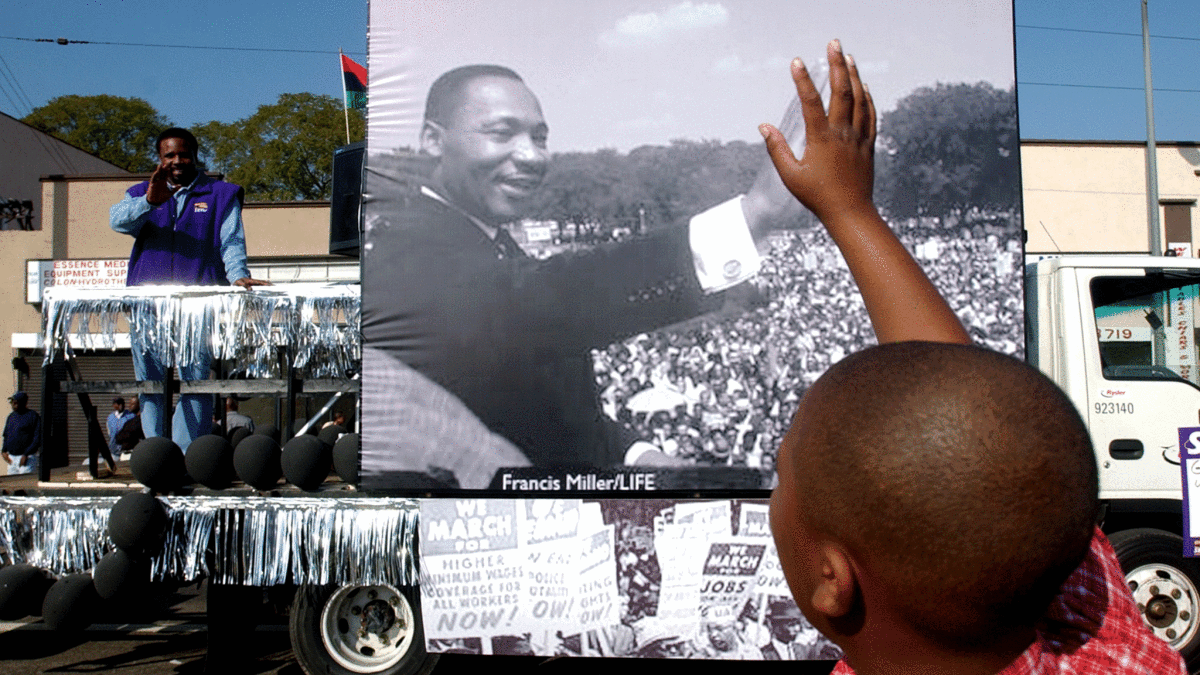Opinion: MLK Day: King’s legacy must go beyond the surface

- Share via
“I have a dream….” Only a few other phrases are arguably as recognizable or poignant.
Today, the nation observes what would have been the 85th birthday of civil rights icon Martin Luther King Jr. Surely, the impact and import of his powerful words delivered in 1963 with that compelling voice, ringing out across the National Mall from the lectern at Lincoln’s feet, are etched into our collective consciousness as a country.
But in 2015, does the “dream” King so eloquently detailed 52 years ago still resonate -- or is it merely a fading echo?
How does King’s legacy impact you? Tweet your thoughts using #MLKToday.
Sure, in some communities, there are parades, proclamations and commemorations to mark the day. But for others, the day is nothing more than a holiday from work and school.
I recall a colleague some years ago offhandedly commenting that the only reason we really even acknowledge King at all is because the kids are off from school. Although this colleague was alive during the societal struggles of the 1960s, for him, King, the civil rights movement and the holiday had no resonance.
He was white, and, to him, that anyone would actually celebrate King’s legacy was a foreign concept -- exclusively a “black thing” that never touched his life.
As someone commented in a recent discussion on Reddit of what it’s like “being white”: “I think that’s the most ‘white’ thing about being white. You never have to think about race. That’s why a lot of white people get upset when someone brings race and racial injustice to their attention. It’s hard to step out from that insulated bubble.”
In some ways, the celebrations across communities may even unintentionally encourage some of that perceived exclusivity by too sharply focusing on community through racial identity. While that was a seminal element of his speech -- of the civil rights movement of the 1960s, of course -- that narrow focus today does a disservice to the potential of King’s message in perpetuity.
Indeed, King himself had said, “Differences have been contrived by outsiders who seek to impose disunity by dividing brothers because the color of their skin has a different shade.”
Its significance must be about more than connecting because of the color of one’s skin and, instead, expand to focus on what King hoped for his children: emphasizing and enhancing the content of one’s character -- and even the nation’s character.
So where is King’s message today? Certainly, some who comment passionately here on latimes.com stories question whether it’s being carried by today’s civil rights leaders; others even suggest it is being perverted to encourage racial division rather than unity.
To be clear, the speech was more than simply a rallying cry for America’s black community. I think, rather, it was a turning point for American culture -- a good one.
That moment was a bookmark in the story of America, a moment for the nation to ponder: Is America to be divided or united? Do we ever intend to live up to our stated ideal of “All men are created equal”? Do we allow hate to fester and poison our culture, or do we aspire to more?
For my preschool-aged son, it is most simply a day off from school. But he is old enough for us, his parents, to plant a notion of why we stop to celebrate the day.
We celebrate King because he forced us to remember our highest ideals and become a better country. People used to say “Well that’s just the way it is.” King made us say, “We should be better” -- and believe it.
In discussing the holiday with my son, my husband and I keep returning to this one line in King’s pivotal speech: “I have a dream that my four little children will one day live in a nation where they will not be judged by the color of their skin, but by the content of their character.”
It’s not enough to wait for society to adopt this outlook. It must be personal.
Despite that powerful pull in nature as humans, we each must push past it and strive to judge people by their character, not by their skin, their group, their country of origin, or any other factor. And, conversely, work to expect that we ourselves are being judged on our character as well.
It’s with this slight refocusing that King’s legacy can continue to move beyond the monumental moment and not relegate the speech and the movement to being simply a monument, frozen in time and relevance.
We would love to hear from you: How does King’s legacy live out for you? Share your thoughts here in the comments or in social media via Twitter, Vine or Instagram using the hashtag #MLKToday. We’ll retweet and share highlights.
I’m interested in the content of your 140 characters. Chat me up: @mmaltaisla
More to Read
Sign up for Essential California
The most important California stories and recommendations in your inbox every morning.
You may occasionally receive promotional content from the Los Angeles Times.











